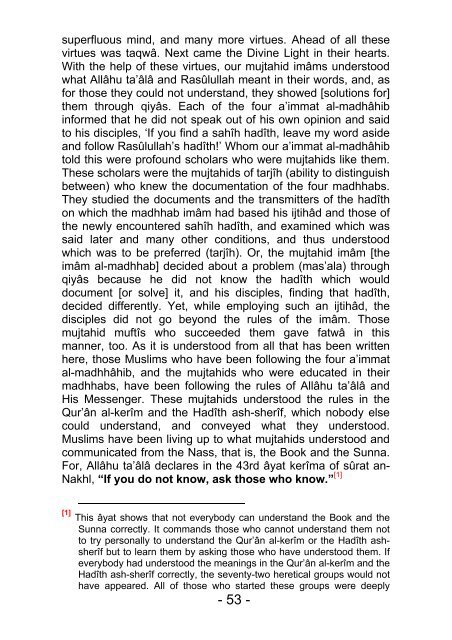8-Belief and Islam - Hakikat Kitabevi
8-Belief and Islam - Hakikat Kitabevi
8-Belief and Islam - Hakikat Kitabevi
Create successful ePaper yourself
Turn your PDF publications into a flip-book with our unique Google optimized e-Paper software.
superfluous mind, <strong>and</strong> many more virtues. Ahead of all these<br />
virtues was taqwâ. Next came the Divine Light in their hearts.<br />
With the help of these virtues, our mujtahid imâms understood<br />
what Allâhu ta’âlâ <strong>and</strong> Rasûlullah meant in their words, <strong>and</strong>, as<br />
for those they could not underst<strong>and</strong>, they showed [solutions for]<br />
them through qiyâs. Each of the four a’immat al-madhâhib<br />
informed that he did not speak out of his own opinion <strong>and</strong> said<br />
to his disciples, ‘If you find a sahîh hadîth, leave my word aside<br />
<strong>and</strong> follow Rasûlullah’s hadîth!’ Whom our a’immat al-madhâhib<br />
told this were profound scholars who were mujtahids like them.<br />
These scholars were the mujtahids of tarjîh (ability to distinguish<br />
between) who knew the documentation of the four madhhabs.<br />
They studied the documents <strong>and</strong> the transmitters of the hadîth<br />
on which the madhhab imâm had based his ijtihâd <strong>and</strong> those of<br />
the newly encountered sahîh hadîth, <strong>and</strong> examined which was<br />
said later <strong>and</strong> many other conditions, <strong>and</strong> thus understood<br />
which was to be preferred (tarjîh). Or, the mujtahid imâm [the<br />
imâm al-madhhab] decided about a problem (mas’ala) through<br />
qiyâs because he did not know the hadîth which would<br />
document [or solve] it, <strong>and</strong> his disciples, finding that hadîth,<br />
decided differently. Yet, while employing such an ijtihâd, the<br />
disciples did not go beyond the rules of the imâm. Those<br />
mujtahid muftîs who succeeded them gave fatwâ in this<br />
manner, too. As it is understood from all that has been written<br />
here, those Muslims who have been following the four a’immat<br />
al-madhhâhib, <strong>and</strong> the mujtahids who were educated in their<br />
madhhabs, have been following the rules of Allâhu ta’âlâ <strong>and</strong><br />
His Messenger. These mujtahids understood the rules in the<br />
Qur’ân al-kerîm <strong>and</strong> the Hadîth ash-sherîf, which nobody else<br />
could underst<strong>and</strong>, <strong>and</strong> conveyed what they understood.<br />
Muslims have been living up to what mujtahids understood <strong>and</strong><br />
communicated from the Nass, that is, the Book <strong>and</strong> the Sunna.<br />
For, Allâhu ta’âlâ declares in the 43rd âyat kerîma of sûrat an-<br />
Nakhl, “If you do not know, ask those who know.” [1]<br />
[1] This âyat shows that not everybody can underst<strong>and</strong> the Book <strong>and</strong> the<br />
Sunna correctly. It comm<strong>and</strong>s those who cannot underst<strong>and</strong> them not<br />
to try personally to underst<strong>and</strong> the Qur’ân al-kerîm or the Hadîth ashsherîf<br />
but to learn them by asking those who have understood them. If<br />
everybody had understood the meanings in the Qur’ân al-kerîm <strong>and</strong> the<br />
Hadîth ash-sherîf correctly, the seventy-two heretical groups would not<br />
have appeared. All of those who started these groups were deeply<br />
- 53 -











